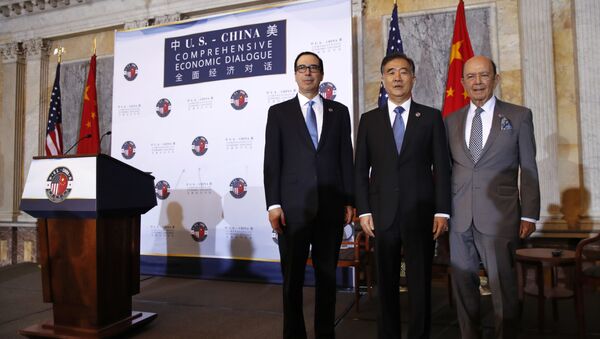The American Secretary of the Treasury Steve Mnuchin said that the United States is highly supportive of the UK's Brexit process and that Britain will be at the front of the queue for a free trade agreement with the US once it has extracted itself from the bloc.
Mr. Mnuchin's comments stand in marked contrast to those of former US President Barack Obama prior to the 2016 EU membership referendum, saying that if Britain voted to leave it would be "at the back of the queue" for an agreement with the US as it prioritized finalizing an agreement with Brussels.
The comments were widely criticized by the Leave campaign as an attempt to intervene in the affairs of Britain and threaten its people for voting "the wrong way."
Stalwarts of the Conservative Party have made several proposals for Britain's future trading orientation after its exit from the European Union.
Joining the Trans-Pacific Partnership
One of the more unconventional suggestions by UK Trade Minister Greg Hands for Britain's future trading posture outside of Europe has been for it to join the Trans-Pacific Partnership (TPP). Originally including 14 states around the Pacific Rim in North America, East Asia, Oceania and Latin America, the TPP was to be a free-trade zone accounting for some 40 percent of global GDP. It's fate was thrown into doubt however when among his first acts as US President, Donald Trump declared that the United States was withdrawing from the agreement on the grounds that it did not sufficiently benefit US industry.
Attempts have been made to revive the agreement without the participation of the US as the Comprehensive and Progressive Agreement for Trans-Pacific Partnership (CPATPP) and on January 15, Australian Trade Minister Steve Ciobo welcomed the prospect of Britain acceding to the TPP.
Observers in Britain however have been less than credulous about the prospects for Britain of such a move, noting that the increasing regionalization of trade patterns, particularly since the period of British decolonization means that the UK will not be able to easily substitute its European trade with such far-flung partners as Australia, Japan and Chile.
The North American Free Trade Agreement
Other Brexiteers are looking west to revive British fortunes after Brexit, suggesting that the country could accede to the North American Free Trade Agreement (NAFTA) currently in force between the United States, Canada and Mexico.
NAFTA was entered into by the three countries in 1994 amidst widespread popular opposition. The effects of trade liberalization across the continent over the following two decades has steadily made the agreement more unpopular, with President Trump again using its flaws to appeal to working-class Americans during the 2016 presidential election.
Attempts to renegotiate the terms of NAFTA began in 2017 but the ratings agency Fitch warned that it could collapse by March if agreement cannot be reached between all three governments.
Public concerns in Britain have also heightened since the Brexit result over fears the country could be subjected to lower-quality US food exports.
Labour leader Jeremy Corbyn on January 14 seemed to reject the prospect of a closer US-UK political and economic relationship after Brexit, saying that the UK should prioritize closer economic relations with Europe and major Asian economies.




